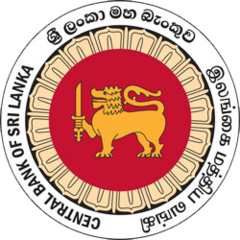Central Bank of Sri Lanka

Central Bank of Sri Lanka logo
|
|
| Headquarters | Colombo |
|---|---|
| Established | 1950 August 28 |
| Governor | Indrajit Coomaraswamy |
| Central bank of | Sri Lanka |
| Currency |
Sri Lankan Rupee LKR (ISO 4217) |
| Preceded by | Currency Board System |
| Website | www |
The Central Bank of Sri Lanka (CBSL) (Sinhala: ශ්රී ලංකා මහ බැංකුව Sri Lanka Maha Bænkuwa) is the monetary authority of Sri Lanka. This is the apex institution in the financial sector in Sri Lanka. Established in 1950 under the Monetary Law Act No.58 of 1949 (MLA), it is a semi-autonomous body and, following the amendments to the MLA in December 2002, is governed by a five-member Monetary Board, comprising the Governor of the CBSL as chairman, Secretary to the Ministry of Finance and Planning and three members appointed by the President of Sri Lanka, on the recommendation of the Minister of Finance, with the concurrence of the Constitutional Council.
The Central Bank of Sri Lanka was established in 1950, two years after independence. The founder governor of the Central Bank of Sri Lanka was John Exter, while the minister of finance at the time was J. R. Jayewardene. Under the former name of Central Bank of Ceylon it replaced the Currency Board that until then had been responsible for issuing the country's money. It is a member of the Asian Clearing Union.
The bank is responsible for the conduct of monetary policy in Sri Lanka and also has wide supervisory powers over the financial system.
The bank is engaged in developing policies to promote financial inclusion and is a member of the Alliance for Financial Inclusion (AFI).
With a view to encouraging and promoting the development of the productive resources of Sri Lanka, the CBSL is responsible for securing its core objectives of economic and price stability and financial system stability. The CBSL is also responsible for currency issue and management. In addition, the CBSL is the advisor on economic affairs as well as the banker to the Government of Sri Lanka (GOSL). On behalf of GOSL, the CBSL, as its agent, is responsible for four agency functions of: management of the Employees Provident Fund; management of the public debt of Sri Lanka; administration of the provisions of the Exchange Control Act; and administration of foreign and government funded credit schemes for regional development.
...
Wikipedia
